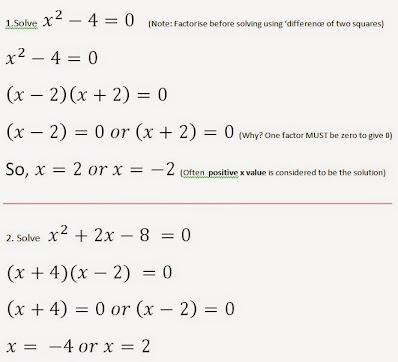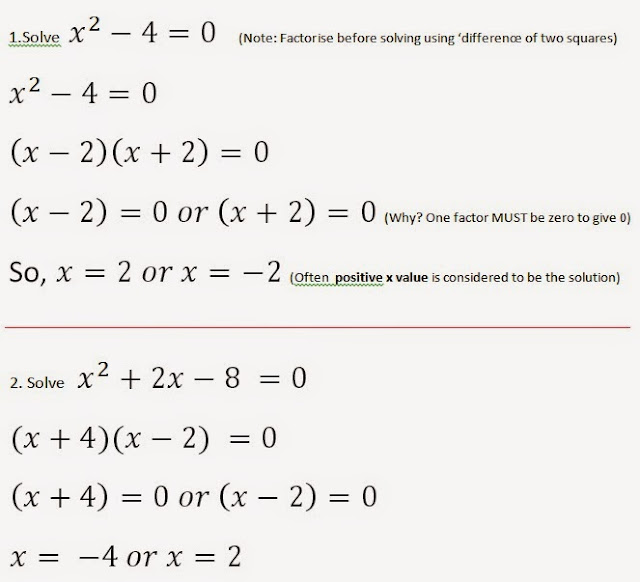*The Quadratic Formula can be used to
solve any Quadratic equation. But, students must know how to use it; they must
know values of a, b, & c; know their directed numbers; and know how to
simplify surds.
WELCOME TO PNG INSIGHT
Showing posts with label Algebra. Show all posts
Showing posts with label Algebra. Show all posts
Solving Complex Quadratic Equation by Factoring - Part (II)

Take a look at another complex equation where factoring does not work. That's where you MUST use the Quadratic Formula
Factorising and Solving Quadratic Equations - GCSE Basic Algebra Questions
Students often find certain topics like Algebra challenging. I’d like to identify the
difference between simple and complex quadratic equations and solve them as
examples. The questions are real GCSE (UK/Edexcel) exam questions.
To solve a quadratic equation (equation of the
highest power of 2), one MUST first know how to factorise the equation.
Factorising and solving simple quadratic expressions
Factorising and solving simple quadratic expressions (and
equations) like x2 – 4 (difference of 2 squares) and x2
+ 4x + 4 can be easy.
But such this work, introduced in Grade 9 or
10, often paves way for harder questions in later years.
See the illustrations below on how to solve quadratic equations. You can relate these examples to the questions your teachers set for you.
Solving Simple Quadratic Equations

Factoring Method or Quadratic Formula (Part I)
The factoring method is introduced early in Year 7 and covered extensively in the later years at secondary schools.
More on Solving Complex Quadratic Equations
Find out either to Factorise and solve or use the Quadratic formula in Part (II)
Download GCSE Maths past papers
You can download the past GCSE exam papers online. Here are some websites that many students prefer to use.
- Maths Genie
- Maths Watch
- Dr Frost maths
- Cobette Maths
- GCSE maths in four weeks
Stationery items you will need for exams are available at Ryman: GCSE maths stationery items
How to Solve Problems involving Fractional Powers
Fractional powers appear past GCSE maths papers. To get the questions right, you must know how to use the Index Law, Surds and rules for solving the algebraic problems.
This may sound overwhelming, but it is not that hard. See the illustrations (x3 questions) below.
How to Solve Fractional Powers Using Index Laws & Surds
If you need more illustrations like these, check out the free maths resources here.
Let’s have a look at 3 Higher Maths Exam Questions
Top tip:
All you need to do is to pull apart the powers and simplify them.
Check out the past maths questions & study guides here.
Download GCSE Maths past papers
You can download the past GCSE exam papers online. Here are some websites that many students prefer to use.
- Maths Genie
- Maths Watch
- Dr Frost maths
- Cobette Maths
- GCSE maths in four weeks
Stationery items you will need for exams are available here: GCSE maths stationery items
Show your working out clearly and logically. Where there are 3 or more marks, do not only write the answer.
Algebra II - Higher Order Questions Sorted by Topic
If this PDF file does not open, click on 'Open in new window' arrow. (Here ▼)
GCSE Maths 2022 Edexcel Foundation Paper 1 Set Non-calculator
The GCSE maths contents are organised into topics. Teachers set our the termly programs and teach them by topics too.
So, you should also use the maths questions by topics when revising for the maths exams. Here are some ways to organise your revision notes by topics. More details here, but here is a brief outline.
Here are some GCSE maths tips for acing your exams.
How to organise your GCSE maths revision notes by topics?
The GCSE maths school syllabus has all the outlines that schools/teachers follow when teaching the content.
All the content should be covered before the exams, but the maths syllabus has lots of things in it. You can be lost in it.
Some suggestions to organise study notes:
Year 7 - 10 Maths Exercise Books
Your exercise books are the best places to find the topics you learn in class. Teachers teach the topics in sequences, so your books will already have the topics in order.
Maths Past Test Papers
The end-of-the-term test papers are fantastic materials to use when looking for maths questions. They are summaries of what you've learnt, condensed.
Maths teachers help
Your maths teacher is the best person to get advice from. S/he knows you well enough to suggest areas you need to improve on. Alternatively, look back at your school report.
Study group
Take time to have conversations about maths problems and topics that you think you need help with. Talk with friends and family about things that you are struggling with.
Private GCSE maths tuition near you
If you need extra help, get an online/local maths tutor to help you with maths problems.
Download GCSE Maths Questions
There are four GCSE exam boards where you can get the maths past paper Pdf for free AQA, Edexcel, SQA and OCR.
The exam boards also provide the marking schemes, examiner reports, and practice materials.
Check out the resources here for more information on GCSE maths exams, study guides and past papers.
Exam Questions: Solving Quadratics Equations
If this PDF file does not open, click on 'Open in new window' arrow. (Here ▼)
Introduction to Algebra
If this PDF file does not open, click on 'Open in new window' arrow. (Here ▼)
GCSE Basic Algebra Questions and Study Guides 2022 Exams
There are four basic parts in GCSE algebra that you should know when revising for the maths papers. They are:
- 1. Substituting
- 2. Expanding
- 3. Factorising
- 4. Solving
GCSE Algebra Questions
Algebra is often regarded by both students and teachers as a tough topic to learn or teach.
Yet, you will do well if master the four skills. The skills are the same in primary (Years 5, 6, 8) and secondary (Years9, 10, 11, 12).
Basic Algebra Questions
Below you'll find some basic algebra questions (and solutions) addressing the four skills. The questions were adapted from the UK GCSE maths exam papers.
SEE MORE ON GRADE 10 EXAM QUESTIONS HERE
1. Substitution
a. Write
down the value of abc when a = 10, b = 2 and c = 0
The answer is 0 (but, many students will write 20) ……………..1 mark
Maths knowledge: any number multiplied by 0 is 0
b. Work out
the value of 1/2x - 3y
when x= 10 and y= 2
2 marks
c. Find the
value of 3x + 2y when x = 4 and y = 5
2 marks
2. Expanding Brackets (note that expanding and factorising are opposites)
Expand the following expressions
a. 3(2y – 5)
= ……………..1 mark
b. 4(2m +
3n) = ……………..1 mark
8m + 12n
c. x(x – 10)
= ……………..1 mark
3. Factorising
Factorise
the following expressions (note that expanding and factorising are opposites)
a. 2a + 10
=
……………..1 mark
Highest Common Factor (HCF) of 2a and 10 is 22(a + 10)
b. 4 + 6x
=
……………..1 mark
HCF = 22(2 + 3x)
c. 3x –
9=
……………..1 mark
3 (x - 3)
d. 2x^2
+ 4x
2 marks
4. Solving equation
Solve the
following equations to find the value of x
a. 4x =
20 ……………..1
mark
x = 5
b. 3x - 7 =
8 ……………..1
mark
c. 8(x + 12)
= 100
2 marks
Check out past algebra questions and maths resources here.
GCSE Foundation Maths Algebra Questions
Solve the
following to find the value of y
a.
y/3 = 9 ……………..1
mark
b.
2y/5 = 4
……………..1 mark
2y = 20.......... ( 20 = 5 x 4)y = 10
c.
2y + 3 / 2 = 5
2 marks
Where to get GCSE Maths Questions?
There are four GCSE exam boards where you can get the maths past paper Pdf for free AQA, Edexcel, SQA and OCR.
The exam boards also provide the marking schemes, examiner reports, and practice materials.
Check out the resources here for more information on GCSE maths exams, study guides and past papers.






